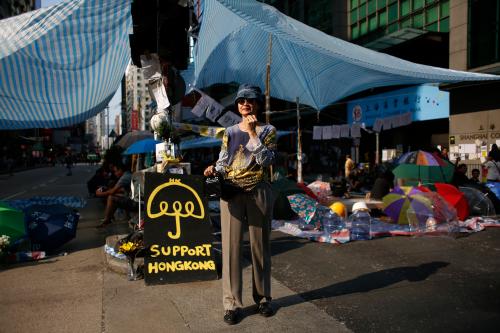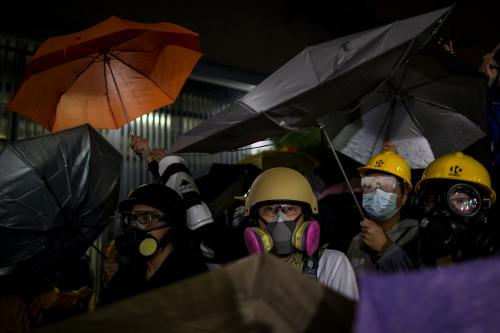Large-scale protest movements have broken out this year in Hong Kong, Lebanon, Iraq, Chile, and Iran. Protestors in each of these countries have mobilized for different reasons, and some face extremely challenging conditions. Brookings scholars unpack the reasons for these protests and their possible outcomes.
Iraq
On October 1 — a date set by activists on social media — protests erupted in Baghdad and other cities.
In an episode of The Current, Senior Fellow Vanda Felbab-Brown explained: “[It’s] this basic element of access to water, access to electricity, access to employment that’s at the cause of the protests.”
As Brookings Visiting Fellow Ranj Alaadin wrote for the New York Times: “The scale and magnitude of the protests [are] unprecedented, as is the violent reaction from the Iraqi government.”
He elaborated that the socio-economic situation in Iraq that sparked the protests is dire:
More than 60 percent of Iraqis are under 24, and 700,000 require jobs every year. Iraq lacks the infrastructure, sustainable governance and private sector to meet the needs of its population.
And, Alaadin sadly notes, over 100 protesters have been killed thus far.
Nonresident Senior Fellow Hady Amr also believes the protests are related to Iraq’s corrupt government structure, writing: “In Iraq … the rich have been getting richer and the poor, poorer.”
For a more in-depth discussion about the future of the Iraqi protests, see our latest event on the matter here.
Lebanon
On October 17, nationwide demonstrations took place across Lebanon — unprecedented in a country that’s usually divided along sectarian and political fault lines. Like in Iraq, the protests are ongoing.
As Amr explains in an episode of The Current, Lebanon’s system of governance is based on a confessional system where power is shared between elites of different religious communities. This system has locked many average Lebanese citizens out of top government positions and only fed corruption in the country. In a blog post, he detailed the situation further:
Hundreds of thousands of people across the multi-religious country have been demonstrating to protest the government’s failure for decades to provide even the most basic services like water and electricity…They’re also protesting against a system where the same families have dominated government — and reaped huge financial spoils — since the country’s founding.
Visiting Fellow Jeffrey Feltman in testimony before the House Subcommittee on the Middle East, North Africa, and International Terrorism added a word of caution though:
Predictions of Lebanon’s doom have often proved, if not wrong, then at least premature. This time, it appears that the curtain may come down on this gravity-defying act.
But on a positive note Feltman also said: “ Even if not all the potential gains are realized immediately, 2019 is a turning point for Lebanon.”
Hong Kong
Protests in Hong Kong broke out in June and have intensified in recent weeks. Demonstrations began in response to a proposed law that would allow criminals to be extradited to the Chinese mainland. Senior Fellow Richard Bush outlined how matters reached this point in Hong Kong, and argued they didn’t necessarily need to:
Five years ago, there was a path being laid towards a government picked completely through competitive election, which in turn would open the way to develop policies to address many of Hong Kong’s numerous social and economic problems. It was a narrow path to be sure, but rather than try to navigate it, factions in China and Hong Kong preferred to fight rather than win, and they appear to have the whip hand again.
Ryan Hass and Susan A. Thornton wrote:
The protests have shed light on deep public dissatisfaction with the current state of affairs. Millions of people have gone to the streets to resist the erosion of civil and political rights that the Hong Kong people were promised.
But it’s not only about politics. Hong Kong youth are particularly angry at the current economic state of affairs, explained Senior Fellow Jeffrey Bader:
Ordinary Hong Kong residents, especially young people, feel trapped in an economy where housing is too expensive, jobs are fewer and of lower quality, and future prospects are dim.
As the protests continue, with fear of severe depression from Beijing, Richard Bush strikes a pessimistic tone:
The Leninist regime is now likely to radically abridge the freedoms it once protected and impose tight controls to ensure that this sort of crisis will never happen again. Whether Hong Kong can survive as an international financial center under such a regime remains to be seen.
For a more in-depth discussion about the future of Hong Kong, see our latest event on the matter here.
Chile
Starting on October 14, over a million protestors took to the streets across Chile. In an episode of The Current, Nonresident Senior Fellow Richard Feinberg discussed how these protests are different from ones in the past:
These are largely spontaneous, that is to say not organized by the established political parties or labor unions, so to interpret the causes requires a certain leap of analysis, because it’s not as though a political party has organized this and said, ‘here are our demands.’
When asked about what has spurred such large protests, Feinberg pinned the problem on slow growth and stagnant wages:
They’re upset because prices are going up and their wages are stagnant. If wages had risen as they had in the past, I think you would see less frustration. ….. but the slowing growth rate is definitely a major contributing factor to the discontent we’re seeing now in the streets in Santiago.
And although it’s yet to be seen if it will ultimately quell the protests, Feinberg details that it does seem a compromise has been reached:
This coming April, voters will be offered a two-part choice: 1) whether a new constitution will be written for Chile, and 2) whether a new constitution should be written by a convention composed of a mixture of existing parliamentarians and freshly elected persons (the rightist preference), or by a constitutional convention entirely comprised of freshly elected persons (a key demand of many protesters).
Iran
Most recently, protests erupted in Iran on November 15 after a major hike in fuel prices.
Visiting Fellow Ali Fathollah-Nejad explains what is driving the protests:
Half of Iranians are believed to live around the poverty line, youth unemployment and inflation are extremely high, and wages are low. Meanwhile, the past few years have seen rising food prices, and income inequality and corruption.
And as Senior Fellow Suzanne Maloney explains, at issue is more than just fuel prices:
The protests are the latest salvo in the Iranian struggle for accountable government that stretches back more than a century. And the fury and desperation of the Iranians on the streets this week strikes at the heart of the legitimacy of the revolutionary system.
Fathollah-Nejad concurs:
In brief, the fuel price hike has merely unearthed the collective grievances of socio-economically vulnerable people whose aspirations for social justice and good governance have time and again been deferred by a corrupt and oligarchic theocracy increasingly seen as their number-one enemy.
Maloney concludes:
To overcome its internal liabilities, the Islamic Republic can rely a time-tested playbook of repression and cooptation. But each collision between a furious citizenry and an inflexible structure of power leaves fissures in the system. Eventually, as happened 40 years ago in Iran, even the most well-fortified regime will shatter.
The Brookings Institution is committed to quality, independence, and impact.
We are supported by a diverse array of funders. In line with our values and policies, each Brookings publication represents the sole views of its author(s).



Commentary
Unpacking this fall’s protests across the world
December 2, 2019